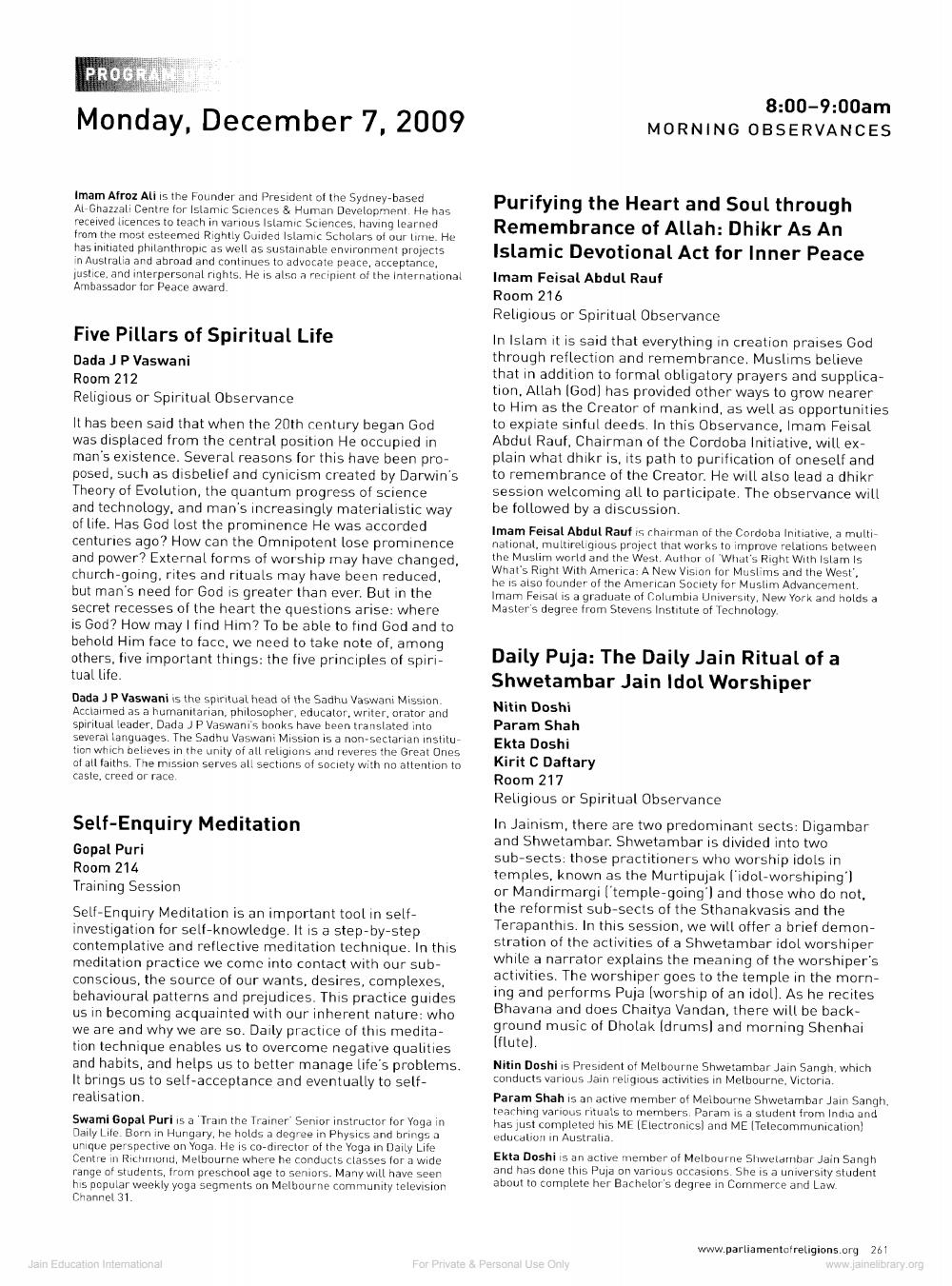________________
PROGRAM D
Monday, December 7, 2009
Imam Afroz Ali is the Founder and President of the Sydney-based Al-Ghazzali Centre for Islamic Sciences & Human Development. He has received licences to teach in various Islamic Sciences, having learned from the most esteemed Rightly Cuided Islamic Scholars of our time. He has initiated philanthropic as well as sustainable environment projects in Australia and abroad and continues to advocate peace, acceptance, justice, and interpersonal rights. He is also a recipient of the international Ambassador for Peace award.
Five Pillars of Spiritual Life
Dada JP Vaswani
Room 212
Religious or Spiritual Observance
It has been said that when the 20th century began God was displaced from the central position He occupied in man's existence. Several reasons for this have been proposed, such as disbelief and cynicism created by Darwin's Theory of Evolution, the quantum progress of science and technology, and man's increasingly materialistic way of life. Has God lost the prominence He was accorded centuries ago? How can the Omnipotent lose prominence and power? External forms of worship may have changed, church-going, rites and rituals may have been reduced, but man's need for God is greater than ever. But in the secret recesses of the heart the questions arise: where is God? How may I find Him? To be able to find God and to behold Him face to face, we need to take note of, among others, five important things: the five principles of spiritual life.
Dada JP Vaswani is the spiritual head of the Sadhu Vaswani Mission. Acclaimed as a humanitarian, philosopher, educator, writer, orator and spiritual leader, Dada JP Vaswani's books have been translated into several languages. The Sadhu Vaswani Mission is a non-sectarian institution which believes in the unity of all religions and reveres the Great Ones of all faiths. The mission serves all sections of society with no attention to caste, creed or race.
Self-Enquiry Meditation
Gopal Puri
Room 214
Training Session
Self-Enquiry Meditation is an important tool in selfinvestigation for self-knowledge. It is a step-by-step contemplative and reflective meditation technique. In this meditation practice we come into contact with our subconscious, the source of our wants, desires, complexes, behavioural patterns and prejudices. This practice guides us in becoming acquainted with our inherent nature: who we are and why we are so. Daily practice of this meditation technique enables us to overcome negative qualities and habits, and helps us to better manage life's problems. It brings us to self-acceptance and eventually to selfrealisation.
Swami Gopal Puri is a 'Train the Trainer' Senior instructor for Yoga in Daily Life. Born in Hungary, he holds a degree in Physics and brings a unique perspective on Yoga. He is co-director of the Yoga in Daily Life Centre in Richmond, Melbourne where he conducts classes for a wide range of students, from preschool age to seniors. Many will have seen his popular weekly yoga segments on Melbourne community television Channel 31.
Jain Education International
8:00-9:00am MORNING OBSERVANCES
Purifying the Heart and Soul through Remembrance of Allah: Dhikr As An Islamic Devotional Act for Inner Peace Imam Feisal Abdul Rauf
Room 216
Religious or Spiritual Observance
In Islam it is said that everything in creation praises God through reflection and remembrance. Muslims believe that in addition to formal obligatory prayers and supplication, Allah (God) has provided other ways to grow nearer to Him as the Creator of mankind, as well as opportunities to expiate sinful deeds. In this Observance, Imam Feisal Abdul Rauf, Chairman of the Cordoba Initiative, will explain what dhikr is, its path to purification of oneself and to remembrance of the Creator. He will also lead a dhikr session welcoming all to participate. The observance will be followed by a discussion.
Imam Feisal Abdul Rauf is chairman of the Cordoba Initiative, a multinational, multireligious project that works to improve relations between the Muslim world and the West. Author of 'What's Right With Islam Is What's Right With America: A New Vision for Muslims and the West'. he is also founder of the American Society for Muslim Advancement. Imam Feisal is a graduate of Columbia University, New York and holds a Master's degree from Stevens Institute of Technology.
Daily Puja: The Daily Jain Ritual of a Shwetambar Jain Idol Worshiper
Nitin Doshi
Param Shah
Ekta Doshi
Kirit C Daftary
Room 217
Religious or Spiritual Observance
In Jainism, there are two predominant sects: Digambar and Shwetambar. Shwetambar is divided into two sub-sects: those practitioners who worship idols in temples, known as the Murtipujak ('idol-worshiping') or Mandirmargi ('temple-going') and those who do not, the reformist sub-sects of the Sthanakvasis and the Terapanthis. In this session, we will offer a brief demonstration of the activities of a Shwetambar idol worshiper while a narrator explains the meaning of the worshiper's activities. The worshiper goes to the temple in the morning and performs Puja (worship of an idol). As he recites Bhavana and does Chaitya Vandan, there will be background music of Dholak (drums) and morning Shenhai (flute).
Nitin Doshi is President of Melbourne Shwetambar Jain Sangh, which conducts various Jain religious activities in Melbourne, Victoria.
Param Shah is an active member of Melbourne Shwetambar Jain Sangh, teaching various rituals to members. Param is a student from India and has just completed his ME (Electronics) and ME (Telecommunication) education in Australia.
Ekta Doshi is an active member of Melbourne Shwetambar Jain Sangh and has done this Puja on various occasions. She is a university student about to complete her Bachelor's degree in Commerce and Law.
For Private & Personal Use Only
www.parliamentofreligions.org 261 www.jainelibrary.org




